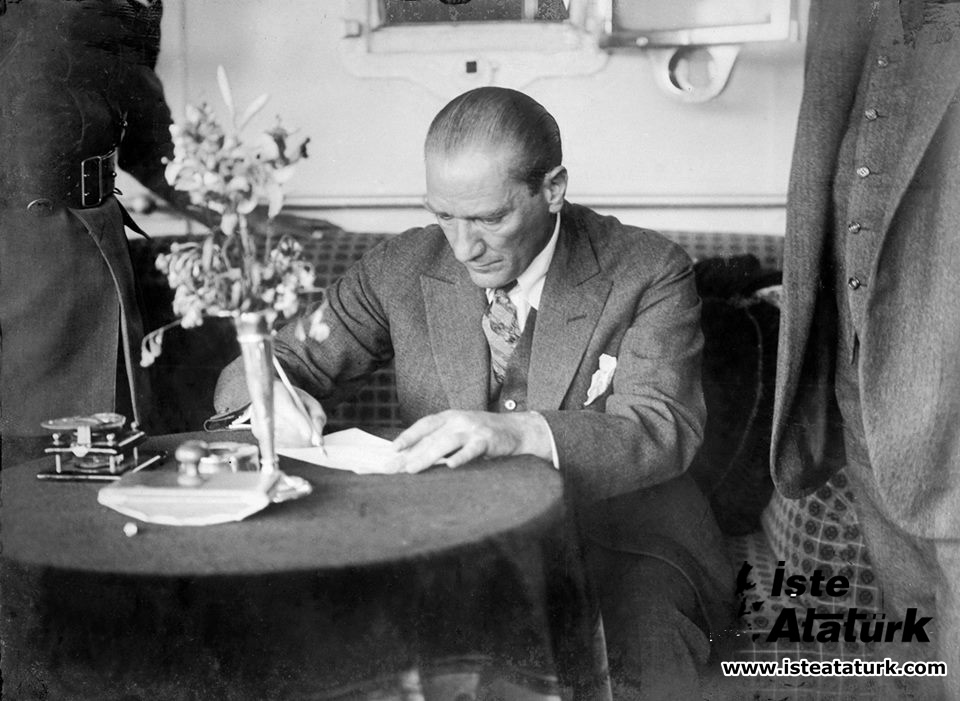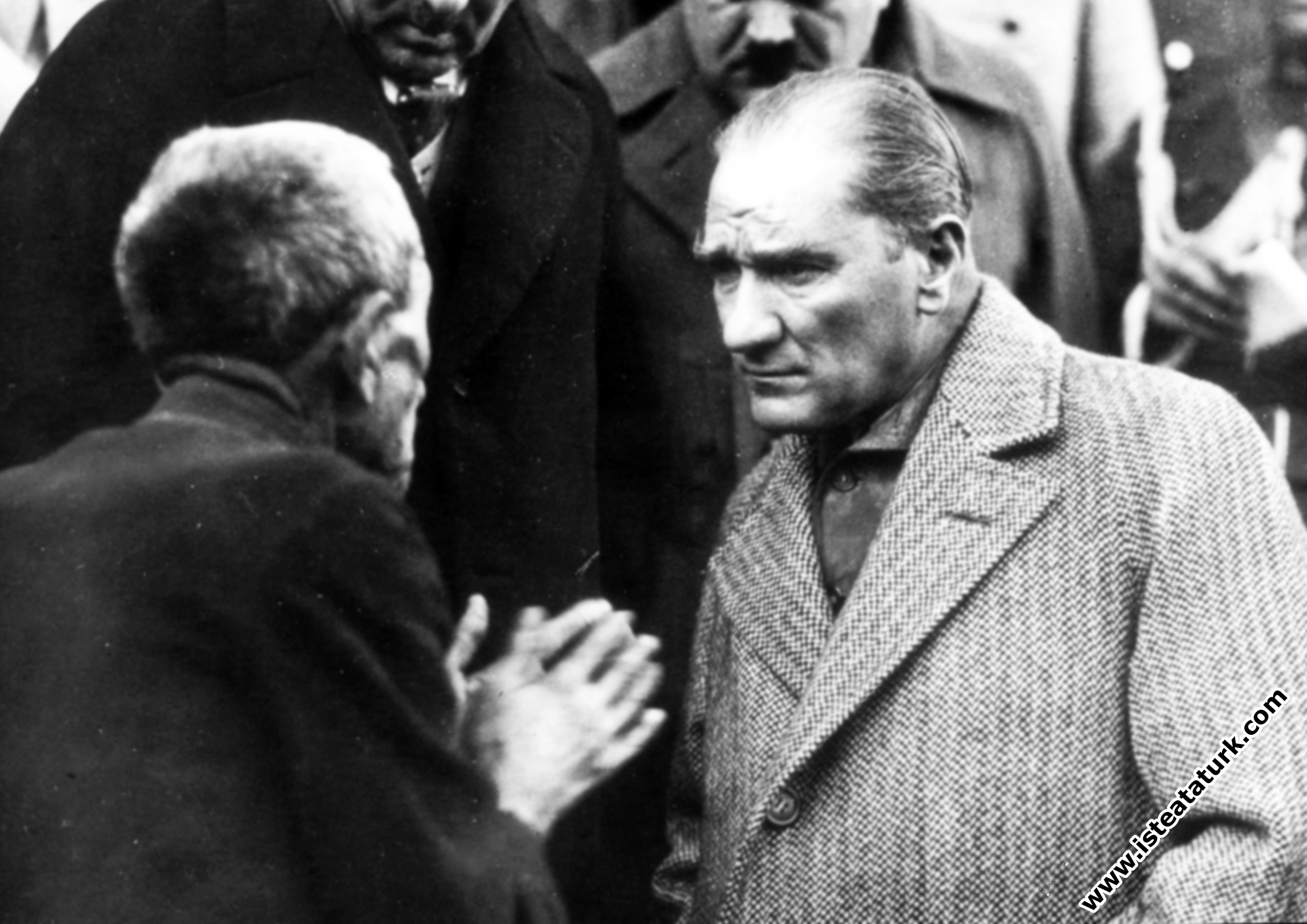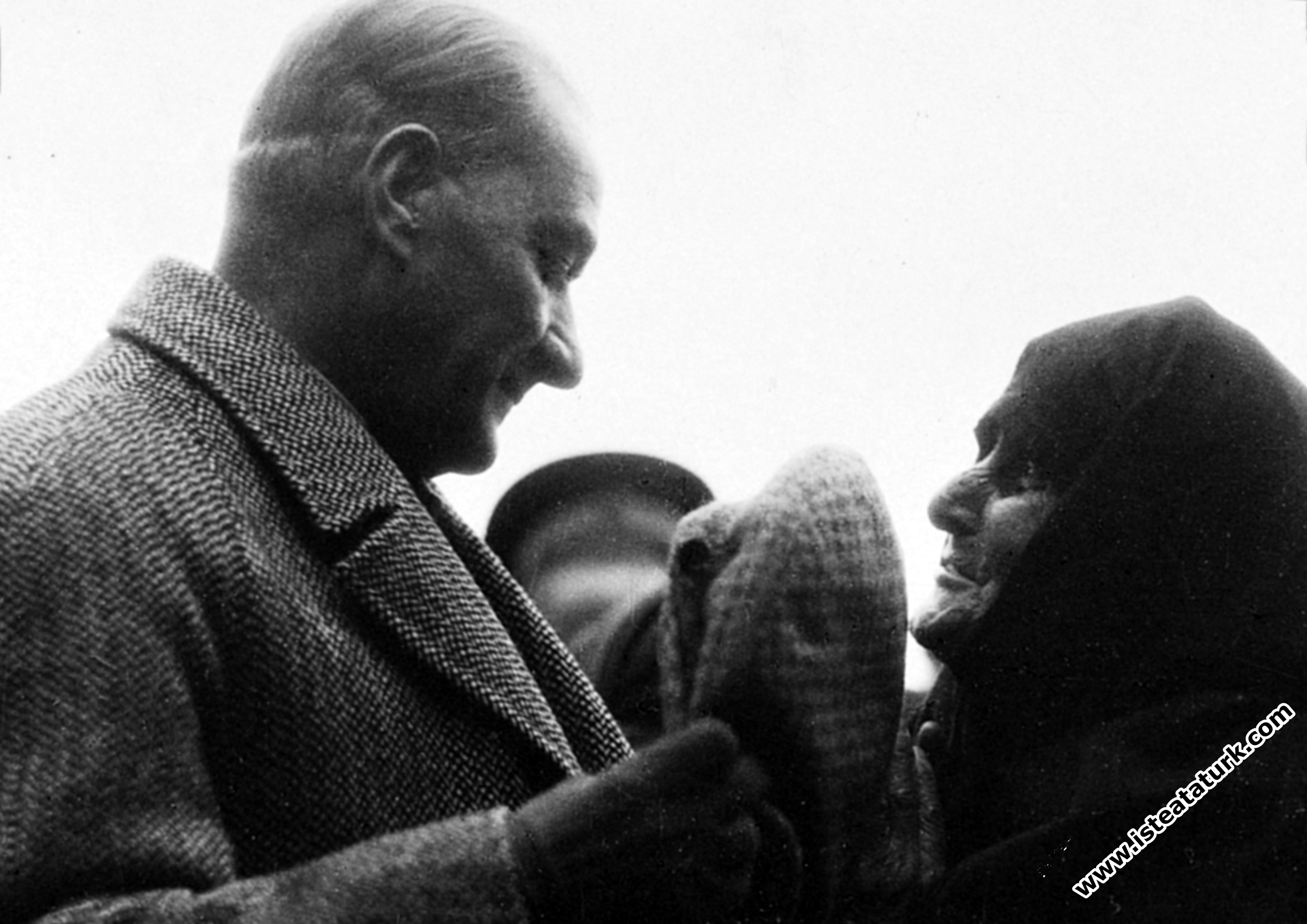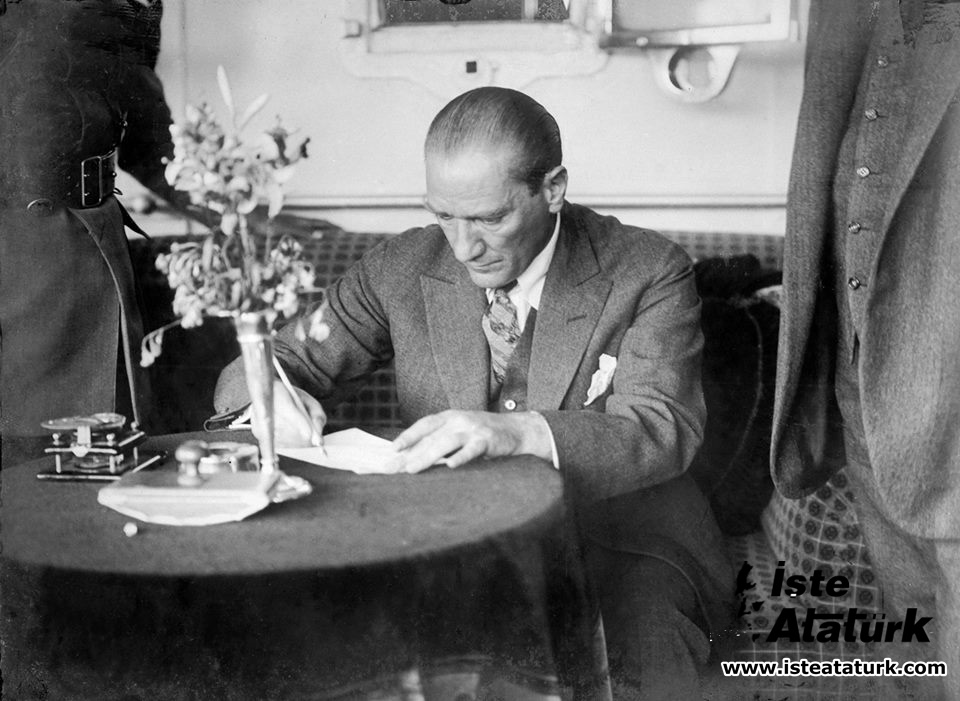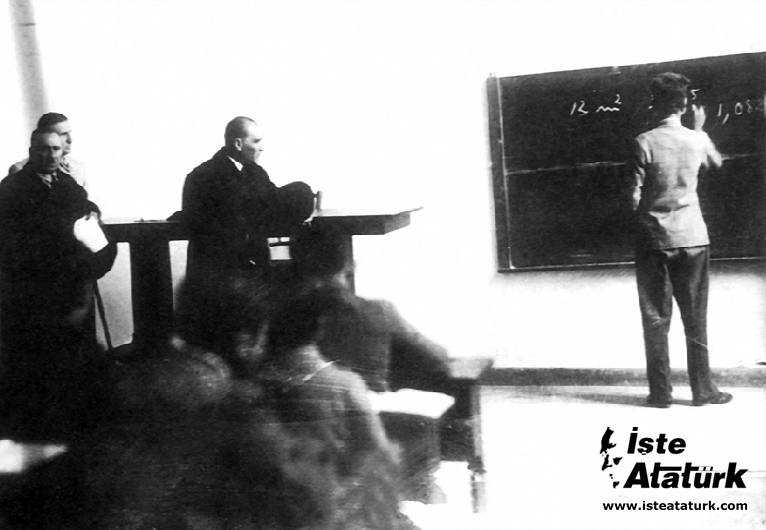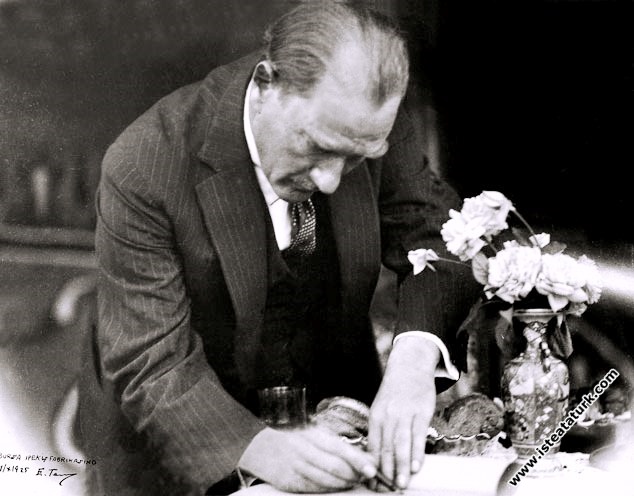
Atatürk, Religion and Secularism
Character Size
"Our religion is the most reasonable and natural religion, and only because of this it has been the last religion. For a religion to be natural, it must conform to reason, science, science and logic. Our religion is completely compatible with them." Mustafa Kemal Atatürk
ATATÜRK RELIGION AND SECULARISM
ENTRANCE
We know that Kemalism is an indivisible whole. No one of the principles and reforms that created it can be considered superior to the other or any of them can be considered non-existent. Because, understanding the real meanings of Atatürk's principles and reforms is only possible with their total consideration. However, as we will explain below, the principle of secularism has a different feature from the others. Secularism is the general feature in the Turkish Revolution, which was made for the establishment of a national, democratic, independent and secular Turkish State. It is an element that dominates the new understanding brought by the Revolution. There is an understanding and an aim in all revolution movements.
In this research, we will try to illuminate why Atatürk adopted secularism, which is the main feature of the Turkish Revolution, and what Atatürk thought about religion and secularism in its historical development.
1. THE MEANING AND HISTORICAL DEVELOPMENT OF SEcularism
The word secularism has passed into our language from French. It actually comes from the Greek adjective laikos. In Greek, people who did not hold the title of clergy were called laikos. In that case, the secular person is from the people; In other words, it means a person who does not belong to the clergy. Coming from this term, in the following centuries, the word laikos was used to describe people other than clergy in a society established with a religious order. As a matter of fact, in Christianity, the churchmen are called Clerici, and the believers community other than this is called secular1.
In addition to its lexical meaning, the word secular also has a meaning as a historical term. It is sufficient to take a brief look at the development of humanity to indicate this meaning. As it is known, religion begins with the emergence of man and exists in all kinds of human societies. At the beginning of these societies, religion is not seen only as a system of creed. It is also a way to explain the universe and a source of necessary precautions and orders for the administration of society. As such, science, art, philosophy, law and the state all have religious origins and religious identities. According to this, the meaning of secularism as a historical term is the separation of religion and philosophy, religion and science, religion and law, religion and art. The separation of religion and state constitutes the last link of this development2.
The real origin of the idea of secularism, of separation of religion and state from each other, is the Renaissance and Reformation movements. They have opened new horizons for humanity. The invention of the printing press stimulated the cheap paper idea life. The Protestantism founded by Luther helped the emergence of secularism by smashing the population of the papacy and strengthening the national consciousness.
XVIII. Until the 19th century, the state continued to preserve its religious character, while discussions on religion and state relations continued. XVIII. YY. At the end of the revolutions that took place in America and France in the second half of the year, the structure of the state changed after the state and religion relations were put into a new order. The secular state type came into being. The biggest factors in this are America's Declaration of Human Rights of 1776 and the Declaration of Human Rights of the French Revolution of 1789.
These declarations contained clauses stating that all people were born free and equal and were free to think and act as they wished in terms of religion.
2. THE INFLUENCE OF RELIGION IN THE OTTOMAN STATE AND EFFORTS OF SEcularization
It is known that in the establishment period of the Ottoman Empire, a more national and secular law was dominant compared to the later periods. So that; a Sheikh Bedreddin appeared, even now he was putting forward ideas that could cause great reactions, and no one interfered with him. However, when he revolted against the state, force was used against him3.
Mustafa Akdağ writes the following about the theocratization of the Ottoman Empire by taking a more religious character over time. “A kind of laicism (or equality of all people before justice and law without any religious influence), which was widely practiced in Ottoman Turkey and developed after Mehmet the Conqueror came to the throne or succeeded in opening Istanbul, came about a century later. His perversion is known in the middle of the Kanuni period”4. Turhan Feyzioğlu, on the other hand, expresses his views on this subject as follows: “The claim that the Ottomans departed from some religious principles after the Conquest of Byzantium does not comply with the historical facts. On the contrary, although national and secular law had a larger place in the establishment period of the state, after the conquest of Byzantium, the state assumed a more theocratic and religious character.
It is a known fact that the title of caliphate obtained by Yavuz Sultan Selim in 1517 was not used much in this period. However, as the state weakened, the caliphate was brought to the fore in order to at least retain the Muslim Ottoman subjects.
The lodges, which were the places of worship and rituals of the sects, spread rapidly as a result of the state's tolerance and became the propaganda center of the sects.
Starting from the 16th century, the period of bigotry and the use of religion for self-interest began. For example, an observatory founded in 1578, was named after Şeyhülislâm Kadızade Ahmet Şemsettin Efendi; This scientific institution was demolished upon a fault (the letter written by the subordinate above) that "observing the heavens is ominous and the state is ruined and devastated wherever it is attempted"6.
In the Ottoman Empire, the discoveries and thoughts of the West were described as infidelity, and the clergy were doing their best to protect the Muslim Ottoman subjects from the infidel inventions that concerned this world. However, it was understood day by day that as long as this continued, the state would be destroyed. As a result of this realization, despite all the resentment against secular institutions and thought, secular institutions began to enter the Ottoman Empire from the 18th century. The rules brought by the French Revolution and the enlightened age were able to show themselves in the Tanzimat period.
In the periods after the 18th century, "institutions such as education, courthouse, etc. were doubled, and secular structures from foreign sources other than shariah emerged alongside these institutions based on religious principles. Especially in the Tanzimat period, laws such as trade, penal, and land laws were quoted from foreign sources other than the Shari'a. Next to Seriye Courts, Nizamiye Courts and secular education institutions next to madrasas”7.
This attempt of the Tanzimatists was unsuccessful. Yunus Nadi expressed this in Tasvir-i Efkar, published on February 27, 1913: “The Tanzimat reformers opened schools, but the madrasahs remained intact. In the middle, there were both a school and a madrasah as places for education. Their education and training, of course, pursued different goals. The result was that neither the school nor the madrasah could provide full benefit. The Tanzimat reformers created the judiciary organization, but the serie courts also preserved their existence, thus, the distribution of justice and the implementation of the law remained far from having a healthy way”. “... Although Tanzimatism went bankrupt, it seems to have cost us a lot as well”8.
Çetin Özek says the following about this subject: “The contradiction between the institutions based on two separate sources, the conflict between these institutions, the failure of the society, which believes in superstitions under the influence of religious interest groups, to adopt these innovations, caused the failure of the Tanzimat. The society, which for years regarded superstitious religious knowledge as a fact, never felt the need for secular thoughts and institutions. In this respect, the Reform Movements in the Ottoman Empire were always repulsive and top-down. His reactionary movements against secular institutions were frequently seen in Ottoman history. The Kabakçı, Janissary riots and the latest March 31 Incident are examples of the reactionary behavior of the society towards secular institutions. These reactionary movements also received a fatwa from the Shaykh al-Islam, the representative of the Ottoman theocracy, who guarded the closed doors of ijtihad. This situation shows that the Ottoman society could not adopt secular thoughts and institutions both intellectually and practically. By the time of the Second Constitutional Monarchy, the great majority understood that modernization was necessary, and the religious bigotry that prevented modernization began to be criticized more.
There were three major currents of ideas during this period. These; They are classified as Occidentalists (Westerners), Turkists and Islamists. All of these movements accepted the necessity of modernization, even to varying degrees, in order to save the state.
In the two articles titled "A very awake sleep" published in the Ictihat magazine, which is the publication organ of the Westerners, all the wishes of the Westerners are listed as follows. When these demands are compared with Atatürk's principles and reforms, it is understood that he influenced him a lot.
1. “Extreme attention will be paid to the education and training of all princes and heirs, the stupid suggestions of blacks and eunuchs will be stopped, young princes will generally join the army and progress there.”
2. “The sultan will have only one wife, the concubine will not have the right to istfras.”
3. “The fez will be completely expelled and a new serpuş will be accepted in its place.”
4. This article is about the use of domestic goods.
5. “Women will dress in the way they want, but they will not waste. The police, the softies, the charioteer's reasonable people, and the kulhanbeys will never be able to interfere with women's clothing. Shaykh al-Islam masters will also not spell and sign declarations on chadors. The police will only interfere with women's affairs in an inappropriate and general manner, and they will perform these duties with great courtesy. Women will be considered the greatest benefactor of the homeland, and men will show them respect and obedience on that path.”
6. “Women and young girls will not run away from men like Muslim Bosniaks and Circassians. Every man will marry the girl whom he sees, examines, likes and chooses. The custom of seeing will be ended.”
7. “A medical school will be opened for girls apart from other schools.”
8. “All dervish lodges and zawiyas, which are sloths of laziness, will be abolished and their income and allocations will be cut and added to the education budget. Nothing will be given to those who have been hurting the people intellectually and scientifically with a few words of patriarchy and phrases consisting of "hu, thank you, those who have achieved", and they will be compelled to work and earn. Those who deceive and deceive one another with treason will be punished.”
9. “All madrasahs will be abolished. In place of the Süleymaniye Madrasa, a ulûm-u literature madrasah from the Collège de France arrangement will be built, and another madrasa-i âliye in the style of Ecole Politechnique will be built instead of the Fatih Madrasa.”
10. "To wear a turban and a robe will be reserved for the ulema only, those who do not have a certificate from religious scholars and those who are unaware of other religious knowledge such as tafsir and hadith will not be able to wear these disguises."
11. “Awliyaya nazirs will be banned, such donations will enter the coffers of the Navy and National Defense Associations.”
Article 12 is about the eradication of euphoria.
13. “Some of the beliefs of the people contrary to the Shari'ah will be corrected. For example, what the zealots and ignorant sheikhs say, "My dear, isn't the world mortal? Don't be content with the few and don't make them rich, those gold will always stick to your skin in the hereafter." It will be ensured that no one believes such nonsense and shenanigans; on the contrary, it will be ensured that he works and earns, becomes rich and gets used to spending money. A sign of any insurance company will be hung under the "Ya hafiz" sign hung on the top of the buildings, and from now on, a masonry house will always be built to avoid the fire."
14. “Practical (that is, oral teaching) schools will be opened in every neighborhood for the elderly who have not or could not attend school.”
In Article 15; It is requested that a dictionary be written in order to preserve Ottoman Turkish as it is, and that the language remains as it is by protecting it against Turkish as well as Arabic and Persian.
In Article 16; The Ottomans are asked to be private entrepreneurs and do their own business, not expecting much from the government and foreigners.
17. “All laws will be reformed, starting with the laws of land and foundations (İjtihad journal, No. 55-57)”. “According to the publications and arguments of the Occidental people, the following few items should be included in this program:” 18. “Honest courts will be abolished and regular courts will be reformed”.
19. “The Mecelle will be abolished or amended to the same degree.”
20. “The existing elifba-yi Osmanî will be discarded and Latin letters will be accepted in its place.”
21. “With the adoption of the European law of civilisation, today's marriage and divorce conditions will be completely changed. The methods of marrying more than one woman and divorcing the wife with a single word will be removed”10.
We have given such a wide coverage to this article, which was published in the form of a Westerner's dream and has the quality of a declaration, because of its great resemblance to the works done in the Republic of Turkey. The above items are the views that were also defended in the intellectual environment in which Atatürk grew up; The similarity between these views and Atatürk's actions shows what kind of interaction there is.
3. ATATÜRK'S UNDERSTANDING OF RELIGION AND SEcularism
Ataturk; sees religion as an element that ensures the continuation of society and believes in its necessity. He said this about it:
“Religion is a necessary institution. There is no possibility of continuation for irreligious nations. There is only one thing that religion is the bond between Allah and the servant. Softa class should not be allowed to broker religion. Those who gain material benefits from religion are disgusting people. We are against this situation and we do not allow it. People who trade in religion like this have deceived our pure and innocent people. It is these people that we and you will fight and fight against.”
Atatürk also believed in the greatness of the religion of Islam. He spoke about this as follows:
“Our religion is the most reasonable and natural religion, and only because of this it has become the last religion. For a religion to be natural, it must comply with reason, science, science and logic. Our religion is perfectly suited to them.”12.
Thinking like this, the question why did Atatürk turn Turkey into a secular state can be answered in two ways:
a. To establish a national state.
b. For the country to reach the level of modern civilization.
a. In terms of the establishment of the national state:
The idea of nationalism that developed after the French Revolution spread all over the world and nationalist uprisings broke out everywhere. The Ottoman Empire, which is one of the multinational empires, was looking for solutions to protect its integrity against these movements. The Ottomanism practice he tried at the beginning did not work, but after the Christian elements broke up one by one, he switched to the practice of Islamism, using the office of Caliphate, at least in order to retain the Muslim elements. The view put forward here is that all Muslims believe that nationalities do not matter. It was necessary for them to unite under the roof of a state as the Ummah of Muhammad. Despite all the propaganda, this did not work either and i. During World War II, our armies were shot in the back by Muslim Arabs.
However, the Ottoman Sultan, who had the title of caliph, used this title and continued to invite the entire Ummah to unity. The people of Anatolia, who had strong religious feelings and were loyal to the Caliph, were made to forget their national feelings, and they were followed first by Ottomanism and then by Islamism. The cost of these adventures was always on him.
Atatürk says the following on this subject:
“Sirs, each of our citizens, co-religionists and fellow countrymen can nurture an ideal in their minds. He is free, he is the headman. No one can interfere with this. But in this connection, I say this: We are not dishonest people who chase big dreams and seem to do things we cannot do. We have attracted the enmity of the whole world because of seeming to have done great and imaginary things until now. We didn't do pan-Islamism, we said maybe we do, we will. The enemies said, "Let's kill them as soon as possible, so as not to make them do it." We did not do panturanism, we said we will do it, and they said let's kill again. That's what the whole case is.
Instead of embellishing the pressure of our enemies on us by running on the notions that we did not and cannot do like this, let's recourse to the orator on the line, let's justify the line, let's know our place”13.
When Atatürk said that we should know our limits; Let's make up our minds, he says, no good can come from anyone other than the Turkish nation living in Anatolia.
Instead of the disintegrating Ottoman Empire after the First World War, it became necessary to establish a state based on nationality. However, achieving this was not easy. During the National Struggle, while Atatürk was calling the Turkish nation to struggle, the caliph-sultan was calling the Muslims to submit. As it is known, during the years of the National Struggle, Atatürk was sentenced to death with the fatwas issued in Istanbul, and as a result, a war of fatwas took place between Ankara and Istanbul. Here, Atatürk responded in the same way to those who used religion. But he had to. Because a religious nation, whose national feelings had not yet developed, could only be persuaded to struggle in this way.
During and after the National Struggle, Atatürk made efforts to transform the nation from being an ummah into a Turkish nation.
Özer Ozankaya has said the following on this subject:
“Until Mustafa Kemal came, no one could see that Ottomanism and the theocratic period could no longer be a bond that would sustain an empire. For example, the famous linguist Şemseddin Sami, one of the leading Ottoman intellectuals after the 19th century, bases the phenomenon of nation on religion in the article “nation” of Kamus-u Türkî, it is correct to say “Islamic nation”, it is wrong to say “Turkish nation”, it is correct to say “Turkish nation”. He wrote that he would. However, as Atatürk wrote in his handwriting in the Civil Information Book in 1930, religion was not one of the founding members of the Turkish nation, that the Turks existed as a nation before they converted to Islam, that Islam could never bring Arab, Iranian and Turkish nations into a single nation. He writes that it weakened the nationalist consciousness of the Turks” 14.
b. In terms of Reaching the Level of Contemporary Civilization:
The greatest goal for Atatürk, the founder of the new Turkish state, was to raise the established state to the level of Western civilization and to ensure its future. In order to do this, it was necessary to make a revolution in education, law and many areas that had a place in daily life. Because it was known that these institutions, which were under the influence of deep fanaticism under the guise of religion, were getting older as time went by, and they were preventing any new steps and reforms as non-religious and anti-religious. Even the reforms implemented by the sultans, who could not even think of going out of religion, especially in the field of military service, saw great reactions, uprisings took place and the sultans were killed. These uprisings, the last of which was the 31 March Incident in Ottoman history, caused the country to fall further behind the level of contemporary civilization.
The Ottoman Empire closed its doors to civilization under the pressure of corrupt religious circles, and as a result, it was far behind the age. So much so that it lagged even the minorities within itself. For example, Ottoman citizens started using the printing press a hundred years later than Ottoman Christians. It's also with a lot of restrictions.
There was also the problem of women, which greatly hindered the development of the country. Atatürk said the following about this subject:
“If a society is content with the acquisition of new necessities by only one of its kind, that society will remain weak on the side. If a nation wants to progress and become civilized, it has to accept this point as a basis.
Atatürk believed that even in order for a woman to fulfill her most important duty, motherhood, she had to be well educated:
“... The most important, best and most virtuous duty of our women, apart from their share in public duties, is to be good mothers. As time progresses, science develops, civilization walks in giant steps, we know the difficulties of raising a child according to the current requirements of life, century and today. The upbringing that mothers will give to their children today is not as simple as in ancient times. Raising children with the necessary features for today's mothers, making their children an active limb for today's life depends on having many high characteristics in their person.
For this reason, our women are obliged to be more enlightened, more enlightened and more knowledgeable than even men. If they really want to be the mother of the nation, they should be like this”16.
With this thought, Atatürk gave the Turkish woman the right to participate in social life with her man with the Turkish Civil Code in 1936. He made her equal with her man.
Of course, the biggest role in the modernization of a society fell on education. It is unthinkable for an uneducated society to rise. Educational institutions in the Ottoman Empire were monopolized by religion for a long time, although educational institutions in the western sense were established with the Tanzimat, this created a duality in education. Schools were located next to the madrasahs, which were religious education institutions.
Two kinds of institutions were training people with two different heads. This led to the emergence of great conflicts in the society and the failure of the Tanzimat.
This was also the case in the legal field. The Nizamiye Courts, which were established next to the Seriye Courts, could not deliver what was expected from them, and increased the duality.
Everything from the dress used in daily life to the calendar, from the scales to the letters used in education was under the influence of religion and these caused the country to be outdated. In order to change these, it was necessary to establish a secular state.
Of course, it was not easy to bring a secular order in a country that is 98% Muslim and has accepted and adopted conservatism as a part of Islam with superstitions. It was supposed to do this as the time came and sequentially.
4. APPLICATION OF THE SEcularism PRINCIPLE AND REACTIONS
a. Application of the Principle of Secularism:
As we mentioned in the introduction of our research, the principle of secularism is the general feature of the Turkish revolution. Laicism is a conscious Turkish consciousness, development and modernization movement.
This movement was developed in phases, time and time, and completed with the secularization of our state, law and education system.
With the Constitution adopted in 1921, sovereignty was given to the nation unconditionally. Thus, the sovereignty that was accepted as belonging to God for centuries was given to the nation for the first time. This was the first phase of the secularism movement. Later, the Sultanate was abolished in 1922, the Republic was proclaimed in 1923, and finally, with the abolition of the Caliphate in 1924, religion no longer had a function in state life.
“The legislator, who saw that the survival of accepted secular institutions needed a spirit and way of thinking first of all, felt the need to reshape our cultural system with a humane, world-related view” 17.
On April 9, 1924, the article stating that the religion of the state was Islam was removed from the Constitution and the Constitution was secularized. The most important step in the secularization of law. It is the adoption of the 1926 Civil Code. This Law, which was implemented as the adaptation of the Swiss civil law to the Turkish society, regulated the social life according to the conditions of the day and made men and women equal individuals.
Before and after the Civil Code, other changes were made besides secularizing the law. The abolition of the Court of Appeals on 8 April 1924, the abolition of the Court of Cassation's Court of Appeals, the secularization of the President's and deputies' oaths on 10 April 1928, and the secularization of the oaths before the Court18. The Legal Revolution of the Republican era continued with the entry into force of the Code of Obligations on May 8, 1928, the Commercial Code on May 19, 1928, and the Penal Code on July 1, 1928. Later, the new Civil and Criminal Procedure Laws and the Execution and Bankruptcy Law came into force19.
Atatürk, who said that if I had not been the President, I would like to be the Minister of National Education, began to emphasize education even during the War of Independence. As a result of this interest, with the Law of Unification of Education adopted on March 3, 1924, the duality of School and Madrasah was ended. Unity in education. Meanwhile, the Seriye and Evkaf Ministry was abolished.
We can list the other steps of the secularism movement that will take the country forward on the path of modernization by supporting other activities that have a place in social life as follows. Closure of dervish lodges and lodges (1925), Hat and Dress Revolution (1925), Alphabet Revolution (1928), Changing Clocks and Measures (1925)
At the end of all these developments, the principle of secularism was included in the Constitution on February 5, 1937, with an amendment made to the Constitution, which had already acquired a secular identity.
b. Reactions:
As we mentioned before, the practice of secularism developed gradually. The reactions from conservative circles, who could not understand how deep-rooted this business was from the first applications, were often personal and weak. But the abolition of the caliphate revealed how far-reaching the event was. Religious interest groups, now feeling in danger, organized the masses and led to riots.
The first major reaction occurred in the environment created by the Progressive Republican Party, which was founded in 1924. This party, which gathered all groups against the administration and administration of the new Turkish state, abused religion with the motto: "The party respects religious thoughts and beliefs", and made the administration seem hostile to religion.
The uprising of Sheikh Said, which took place in this environment, was bloodily suppressed. The Progressive Republican Party, which was involved in the events, was also closed down.
In 1925, incidents arose against the decision of the officers to wear hats, and it was possible to prevent the events by sending forces against those who regarded wearing hats as infidelity.
One of the saddest reactions against secularism is the Menemen incident. Lieutenant Kubilay was martyred in the incident organized by the Naqshbandi sect. The incident was suppressed immediately and on January 3, 1931, at the end of the trial held at the General Mustafa Muğlalı Court of War, 23 people were hanged.
On February 5, 1933, there were demonstrations against the Turkish azan in Bursa, but the events could be prevented before they escalated.
After these events, the principle of secularism was tried to be weakened. The protection of this principle, which is the basis of the Turkish Revolution, is provided by laws. Of course, the operation of these laws first depends on the secular thought of those who apply them.
CONCLUSION
In conclusion, Atatürk's secularism policy does not interfere with the religious beliefs of individuals at all, but keeps the state separate from religion.
In our country, the principle of secularism was needed in two aspects.
1. To become a nation by becoming a nation and to attain a sense of national unity.
2. To reach the modern world civilization.
“In historical development, the prerequisite for political modernization is social economic development. However, this is not enough. When we consider that in some Middle Eastern countries (Egypt, Iran) whose economic modernization is as old as Turkey (Egypt, Iran), the political institutions and ideology are at a much lower level than in our country, and finally, despite its setbacks, a democracy at the level of Turkish democracy has not yet been found in these countries at the beginning of the 20th century. It is clear that its changing social structure was influenced and directed by secular revolutions... We see that secularism and the revolutions that brought together secularism in Turkish society, which started to change since the 19th century and suffered from this change, had accelerated effects on social-political development”20.
Although there are ups and downs in the implementation of the principle of secularism, the expectations of our country have been and are being fulfilled.
The current situation in our country shows that the future of the Republic of Turkey can only be guaranteed by clinging to Atatürk's Principles and Revolutions.
1 Çetin Özek, Secularism in Turkey, Istanbul University Pub., Baha Press, Istanbul, 1962, sl
2 Enver Ziya Karal, “Revolution and Secularism”, Atatürk, Religion and Secularism, Menteş Press, Istanbul, 1968, p.23.
3 M. Serafettin; Sheikh Bedrettin, Son of Simavna Kadi, Evkaf-ı Islamiye Printing House, Şehzadebaşı, 1925.
4 Mustafa Akdag; Economic and Social History of Turkey, c.II (1453-1559), DTCF Pub., Ankara 1971, p.49.
5 Turhan Feyzioglu; The Foundation Stone of the Turkish Revolution, Laicism, separate edition from Atatürk Yolu, Istanbul, 1981, p. 181.
6 Faruk Güventürk-Fuat Kadıoğlu, Bigotry and Kemalism in the Light of Religion, National Press, Ankara 1967, pp.141-142.
7 Cetin Ozek, supra, p. 15.
8 Peyami Safa, Perspectives on the Turkish Revolution, Atatürk Research Center Pub. Ankara, 1988, p.22.
9 Çetin Özek, supra, p.15.
10 Peyami Safa; ibid, pp.33-35.
11 Utkan Kocatürk, Atatürk's Ideas and Thoughts, Turhan Bookstore, Ankara, 1984, p.193.
12 Atatürk's Speeches and Statements, Vol: II, Collected by Nimet Unan, Turkish Revolution History Ens. Arrow. 2nd Edition, 1959, p. 90.
13 Enver Ziya Karal, ibid, p.27.
14 Ozer Ozankaya, Ataturk and Laicism, 2nd Edition, Tekin Yay, Istanbul, 1983, p. 132.
15 Major Speeches of Atatürk (1920-1938), Edited by Herbert Melzig, Istanbul, 1942, p.95.
16 Atatürk's Speeches and Statements II, supra, pp.151-152.
17 Hüsamettin Unsal, “Secularism and Atatürk's Secular Policy”, 100th Anniversary Atatürk Conferences, Energy and Natural Resources Bak. Ankara, 1981, p. 160.
While the oaths of the 18 Deputies were stated in the 1924 Code Principle as “I swear that I will not pursue an aim contrary to the happiness of the Homeland and the Nation and the domination of the Nation, on the contrary, and that I will not leave the principles of the Republic”, in 10.4.1928, “I swear that the happiness and security of the Homeland and the Nation and the dominance of the Nation were in conflict with each other”. I promise on my honor that I will not follow the principles of the Republic and will not abandon my loyalty to the principles of the Republic”. (Bekir Sıtkı Yalçın, İsmet Gönülal, Atatürk Revolution, Ministry of Culture and Tourism Publication; Ankara, 1984, p.356.)
19 Turhan Feyzioğlu, ibid, p.202.
20 İlber Ortaylı, “On Secular Movements in the Ottoman State”, Development of Turkish Political Life, Beta Publishing, Istanbul, 1986, p. 168.
* Head of the Department of Secondary Education Social Sciences, Faculty of Education, Abant İzzet Baysal University
Assist. Assoc. Dr. Cemal Avci
Source: ATATÜRK ARAŞTIRMA MERKEZİ DERGİSİ, Sayı 18, Cilt: VI, Temmuz 1990
